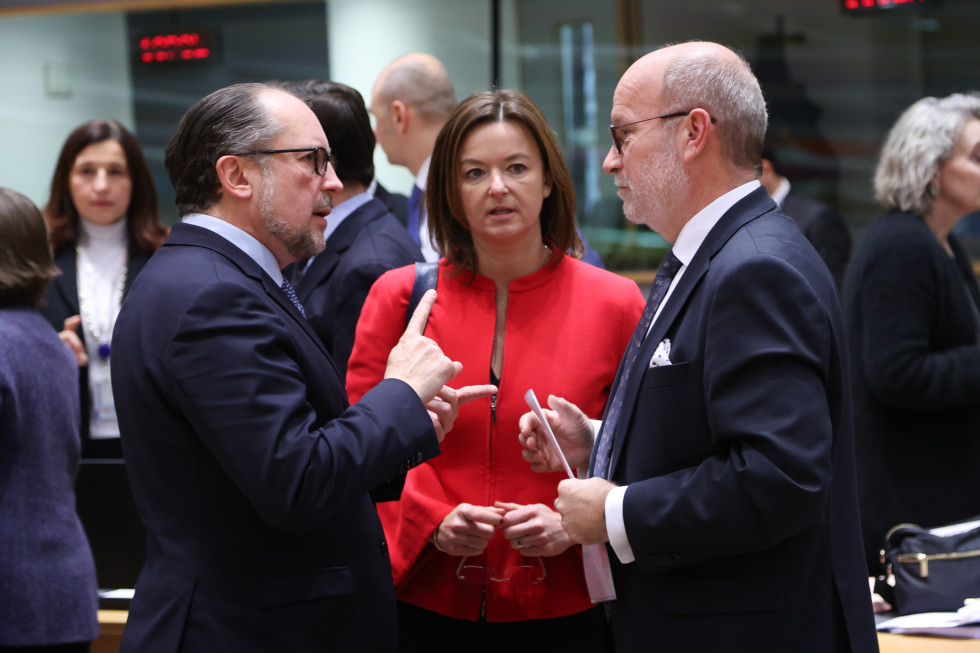Minister Fajon at the FAC meeting supports aid to Ukraine and reports on her visit to Podgorica
- Ministry of Foreign Affairs

Minister Fajon in discussion with other participants | Author EU
The ministers began the meeting with a discussion on the broader impact of Russia's aggression in Ukraine, with a focus on restrictive measures against Russia and the prevention of evasion in their implementation. They reiterated the importance of ensuring accountability for war crimes in Ukraine and of providing assistance in the country's comprehensive reconstruction. They also discussed the next package of assistance to Ukraine under the European Peace Facility. "We all want peace in Ukraine. Slovenia is doing its utmost to help. I gave my support for an additional 500 million euros in assistance to Kyiv from the European Peace Facility. I also recalled that we must not forget the countries of the Western Balkans and called for an early investigation into the crimes committed in the country," the Minister stressed.
Minister Fajon and Austrian Foreign Minister Schallenberg briefed the ministers on their joint visit to Podgorica on 21 December 2022 on behalf and at the request of High Representative Borrell. "We conveyed the message to our hosts in Montenegro that, in order to address the situation in the country, the missing constitutional judges must first be elected, which will pave the way for elections. This must be a priority," said the Minister. She also briefed them on her visit to Podgorica on 15 January 2023.
Minister Fajon welcomed the meeting of EU foreign ministers with Prime Minister of Palestine Dr Mohammad Ibrahim Shtayyeh and Minister of Foreign Affairs Riyad al-Maliki, which was aimed at assessing the situation in Palestine, Palestinian-Israeli relations and the EU's cooperation with Palestine. Minister Fajon expressed concern about the precarious situation on the ground, the increase in violence, particularly in the West Bank and East Jerusalem, and the unilateral Israeli acts that are making life even more difficult for Palestinians. "Slovenia continues to support all efforts to revitalise the two-state peace process," the Minister stressed. She also called for elections in Palestine to be held as soon as possible.
In the context of the discussion on topical issues, the Minister drew attention to the situation of women and girls in Afghanistan. "Slovenia will always – especially in the light of its feminist foreign policy – advocate the complete elimination of all violations of the rights of women and girls," highlighted the Minister, condemning the recent Taliban decision to deny women access to university education and the order to all NGOs in Afghanistan to immediately dismiss all female employees.
Before the start of the meeting, ministers met with the Director General of the International Atomic Energy Agency, Mariano Grossi. They discussed nuclear security in Europe and the world, especially in relation to the war in Ukraine and Iran's refusal to cooperate with the Agency.
Minister Fajon and Foreign Minister Tajani met on the margins of the meeting to discuss the preparations for the Minister's visit to Slovenia in mid-March. They focused on the situation on the Western Balkans route, the successful cooperation between the two police forces in the fight against irregular immigration and joint support for the Western Balkan countries on their path towards the EU.
She also met with EU Special Representative for the Belgrade-Pristina Dialogue Miroslav Lajčák and European Commissioner for Neighbourhood and Enlargement Olivér Várhelyi.
The Foreign Affairs Council adopted conclusions on priorities for cooperation with the Council of Europe 2023–2025 and on EU priorities in the field of human rights.

